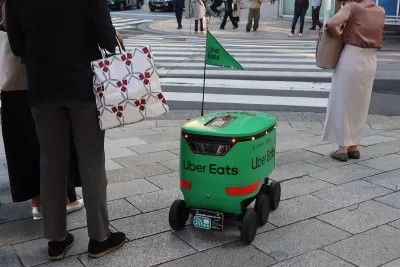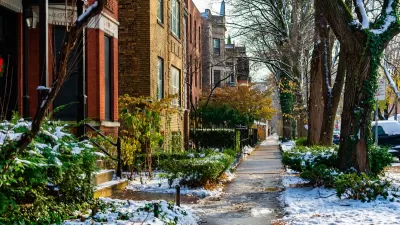Ride-hailing and scooter companies blindsided cities. They shouldn’t let delivery robots do the same.

Writing in Policy Options, Gavin MacGregor and Mischa Young argue that cities should develop strategies for mitigating the negative impacts of delivery robots and “ensure this intrusive technology does not disadvantage city sidewalk users.”
As MacGregor and Young note, delivery robots, which have been deployed in cities around the world, can “impede pedestrian flow, cause discomfort and amplify navigation challenges in crowded pedestrian environments.” Larger and heavier robots could mean a higher risk of injuries if they collide with pedestrians. “Broader adoption of delivery robots could turn less frequent incidents into a wider problem for pedestrians, cyclists and wheelchair users.”
The authors point out that the proliferation of delivery robots could disproportionately impact people with mobility challenges and the elderly. “Too often, the deployment of new urban technologies focuses on those who stand to benefit while overlooking those who could be excluded or burdened by them.”
The authors write that cities could avoid getting blindsided in the same way they did when ride-hailing companies like Uber were suddenly introduced on city streets to ensure the technology is deployed safely and equitably, not at the expense of vulnerable populations and public space. “A proactive and pre-emptive policy framework is essential to mitigate potential challenges associated with the widespread deployment of these delivery technologies.”
FULL STORY: Cities need to get ahead of autonomous delivery robots

Maui's Vacation Rental Debate Turns Ugly
Verbal attacks, misinformation campaigns and fistfights plague a high-stakes debate to convert thousands of vacation rentals into long-term housing.

Planetizen Federal Action Tracker
A weekly monitor of how Trump’s orders and actions are impacting planners and planning in America.

Chicago’s Ghost Rails
Just beneath the surface of the modern city lie the remnants of its expansive early 20th-century streetcar system.

Bend, Oregon Zoning Reforms Prioritize Small-Scale Housing
The city altered its zoning code to allow multi-family housing and eliminated parking mandates citywide.

Amtrak Cutting Jobs, Funding to High-Speed Rail
The agency plans to cut 10 percent of its workforce and has confirmed it will not fund new high-speed rail projects.

LA Denies Basic Services to Unhoused Residents
The city has repeatedly failed to respond to requests for trash pickup at encampment sites, and eliminated a program that provided mobile showers and toilets.
Urban Design for Planners 1: Software Tools
This six-course series explores essential urban design concepts using open source software and equips planners with the tools they need to participate fully in the urban design process.
Planning for Universal Design
Learn the tools for implementing Universal Design in planning regulations.
planning NEXT
Appalachian Highlands Housing Partners
Mpact (founded as Rail~Volution)
City of Camden Redevelopment Agency
City of Astoria
City of Portland
City of Laramie





























